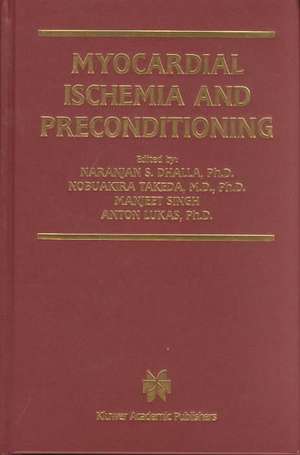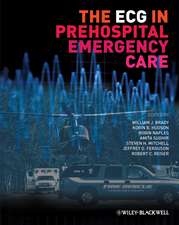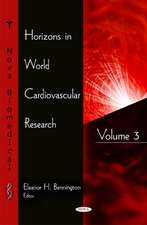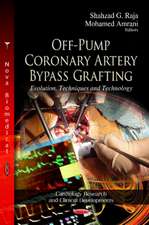Myocardial Ischemia and Preconditioning: Progress in Experimental Cardiology, cartea 6
Editat de Naranjan S. Dhalla, Nobuakira Takeda, Manjeet Singh, Anton Lukasen Limba Engleză Hardback – 31 dec 2002
| Toate formatele și edițiile | Preț | Express |
|---|---|---|
| Paperback (1) | 1424.16 lei 43-57 zile | |
| Springer Us – noi 2012 | 1424.16 lei 43-57 zile | |
| Hardback (1) | 1428.91 lei 43-57 zile | |
| Springer Us – 31 dec 2002 | 1428.91 lei 43-57 zile |
Preț: 1428.91 lei
Preț vechi: 1504.11 lei
-5% Nou
Puncte Express: 2143
Preț estimativ în valută:
273.41€ • 286.24$ • 226.24£
273.41€ • 286.24$ • 226.24£
Carte tipărită la comandă
Livrare economică 07-21 aprilie
Preluare comenzi: 021 569.72.76
Specificații
ISBN-13: 9781402071959
ISBN-10: 1402071957
Pagini: 560
Ilustrații: XVII, 541 p.
Dimensiuni: 155 x 235 x 40 mm
Greutate: 0.89 kg
Ediția:2003
Editura: Springer Us
Colecția Springer
Seria Progress in Experimental Cardiology
Locul publicării:New York, NY, United States
ISBN-10: 1402071957
Pagini: 560
Ilustrații: XVII, 541 p.
Dimensiuni: 155 x 235 x 40 mm
Greutate: 0.89 kg
Ediția:2003
Editura: Springer Us
Colecția Springer
Seria Progress in Experimental Cardiology
Locul publicării:New York, NY, United States
Public țintă
ResearchCuprins
1. PTCA Acutely Expands Perfused Myocardial Mass and Increases Flow Homogeneity.- 2. Angiogenic Therapy by Coronary Collateral Recruitment and Arteriogenesis.- 3. Regulatory Role of ERK-Dependent Pathways in Activity of the Na+/H+ Exchanger in the Healthy and Ischemic Myocardium.- 4. Sodium Overload and Mitochondrial Damage in Ischemic/Reperfused Heart.- 5. Antisense-Induced Underexpression of Manganese Superoxide Dismutase Extends Myocardial Ischemia-Reperfusion Injury.- 6. Phospholamban Phosphorylation During Ischemia and Reperfusion Injury: Mechanisms and Functional Implications.- 7. Phospholipase C-Mediated Signaling in Ischemic Heart Disease.- 8. Effects of Sequential Ischemia-Reperfusion Cycles on Cyclic Nucleotide Phosphodiesterase Activity in Pig Heart.- 9. Inducible Nitric Oxide Synthase in Cardiac Adaption to Ischemia.- 10. Long Term Follow-Up of Leukocyte Function During Myocardial Reperfusion Injury.- 11. Mechanisms of Cellular Alterations Due to Ischemia-Reperfusion Injury in the Heart.- 12. Mechanisms for Ischemia/Reperfusion Injury: Application of 23Na Magnetic Resonance Spectroscopy.- 13. Is Reduced Cell Swelling a Plausible End-Effector of Ischemic Preconditioning Protection?.- 14. Cardioprotection by Mitochondrial KATP Channel in both Early and Late Preconditioning.- 15. Role of Mitochondrial Membrane Potential in Cardiac Protection against Ischemia.- 16. Hypoxic Reperfusion after Brief Ischemia Potentiates Ischemic Preconditioning in Isolated Rat Hearts.- 17. Molecular Basis for the Cardioprotective Effect of Herbal Drugs in Ischemic Heart Disease: An Experimental Study.- 18. Ischaemic and Pharmacological Preconditioning is Associated with Attenuation of p38 MAPK Activation During Sustained Ischaemia and Reperfusion.- 19. A Role for the PhosphatidyHnositol-3-Kinase Pathway in Preconditioning.- 20. Myofilament Calcium Responsiveness in Stunning and Preconditioning.- 21. How to Mediate Cardioprotection in Ischemic Hearts—Role of Adenosine.- 22. On the Role of Adenosine in Classical and Interorgan Preconditioning of the Heart.- 23. Adenosine A3 Receptor Induced Delayed Preconditioning: Essential Role of Nuclear Factor ?B, Nitric Oxide Synthase and Mitochondrial KATP Channels.- 24. Activation of Adenosine A1 and A3 Receptors Protects Mitochondria during Hypoxia in Cardiomyocytes by Distinct Mechanisms.- 25. Non Ischemic Myocardial Preconditioning by Tachycardia and Exercise.- 26. Myocardial Effects of Sodium-Hydrogen Exchange Inhibition During Resuscitation From Ventricular Fibrillation.- 27. Na/H Exchange and Arrhythmia.- 28. Mechanisms of Functional Disturbances of Various HERG Mutations in Patients with Long QT Syndrome 2 (LQT2).- 29. Sensitivity to Ischemic Injury in the Diabetic Heart: A Dichotomy between Susceptibility to Ventricular Arrhythmias and the Size of Myocardial Infarction.- 30. Exercise and Delayed Preconditioning in the Protection of the Heart Against Ventricular Arrhythmias: Crucial Role of Nitric Oxide.- 31. Myocardioprotection Against Ischemia and Reperfusion Injury by Endothelin Receptor Antagonists.- 32. Role of Lipid Peroxidation in Myocardial Ischemic Injury.- 33. Involvement of Na+/Ca2+ Exchange in Normal Cardiac Excitation-Contraction Coupling and in Ca2+ Overload during Ischemia and Reperfusion.- 34. Modulation of Sarcoplasmic Reticulum Calcium Release as a Cardioprotective Strategy.- 35. Early Detection of Ischemic Myocardial Damage by Glycogen Phosphorylase Isoenzyme BB: A Biomarker for Evaluation of Chest Pain and Evolving Infarction in Patients.



















